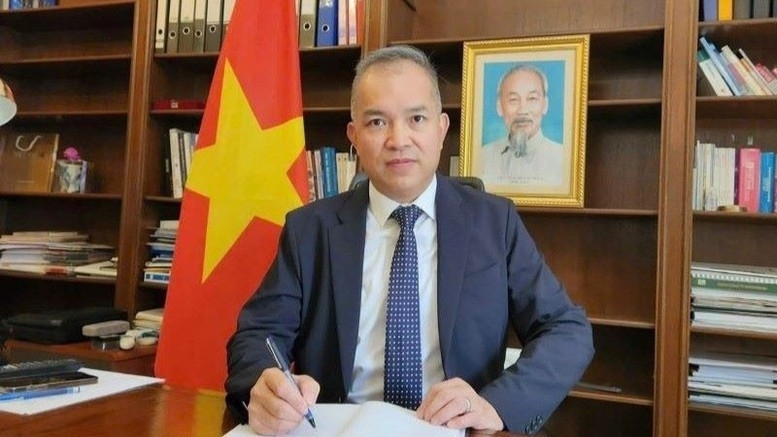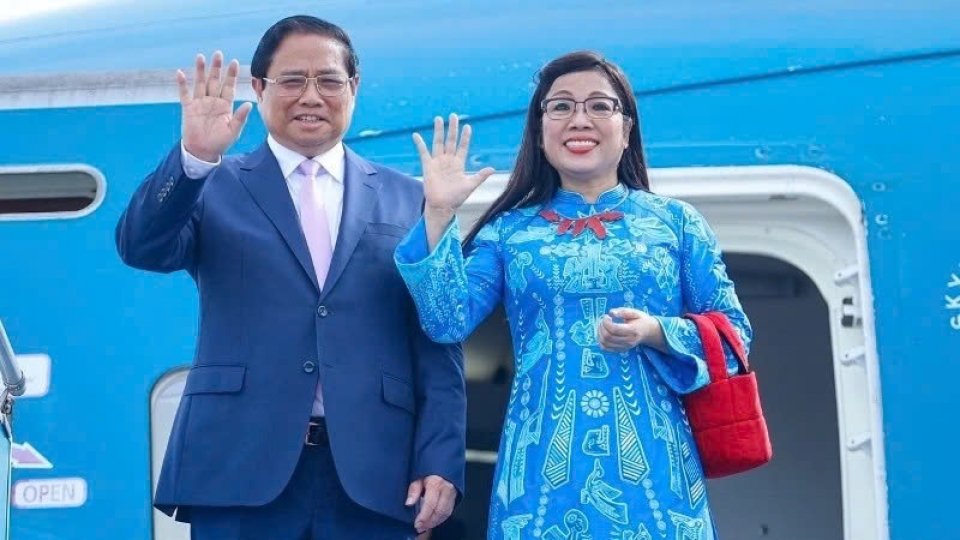PM’s visit to Kuwait to open new development phase for bilateral ties: Ambassador
Prime Minister Pham Minh Chinh’s official visit to Kuwait from November 16-18, made at the invitation of his Kuwaiti counterpart Sheikh Ahmad Abdullah Al-Ahmad Al Sabah, will help open a new stage of development in bilateral relations, according to Vietnamese Ambassador to the Middle East country Nguyen Duc Thang.

Thang affirmed that the visit carries great significance, not only for the bilateral relations but also as a reaffirmation of Vietnam’s foreign policy towards the region as a whole.
This diplomatic activity continues the PM’s trips to three Gulf countries in 2024, demonstrating Vietnam’s determination to implement its external affairs strategy towards the Middle East and promptly realise Resolution 59-NQ/TW on international integration in the new context. Through high-level diplomatic engagements, it continues to strengthen its friendly relations, enhance political trust, expand markets, and explore areas with significant untapped cooperation potential with Kuwait.
This is the first visit by a high-level Vietnamese leader to Kuwait in 16 years, taking place at a time when the two countries are preparing to celebrate the 50th anniversary of the establishment of diplomatic relations in January 2026, the ambassador said, stressing that the time is ripe for both countries to consolidate and deepen their bilateral relationship, elevating it to new heights and making practical contributions to each country’s development goals.
As Kuwait is the current chair of the Gulf Cooperation Council (GCC), and has adjusted its policies and shown greater interest in Asian countries, including ASEAN member states, Vietnam and Kuwait can serve as a bridge to promote interregional cooperation between ASEAN and the GCC. At the same time, Vietnam hopes that Kuwait will promote its role in advancing the launch of negotiations for a GCC-Vietnam Free Trade Agreement (FTA) as early as 2025.
During the visit, PM Chinh will meet with the Amir of Kuwait Sheikh Meshal Al-Ahmad Al-Jaber Al-Sabah and Crown Prince Sheikh Sabah Al-Khaled Al-Hamad Al-Sabah; hold talks with his counterpart Sheikh Ahmad Al-Abdullah Al-Ahmad Al-Sabah; and have meetings with several ministers and leaders of major economic corporations. The two sides will review the progress achieved in their nearly half-century-long friendship and cooperation, as well as exchange views, reach consensus on orientations and measures, and define a broader framework for cooperation in the coming period.
A highlight of the visit will be his policy speech at the Kuwait Diplomatic Institute, in which he will deliver strong messages about Vietnam’s steady socio-economic development, while underscoring the country’s orientations, policies, and priorities in fostering closer and multifaceted cooperation with the Middle East region in general and with Kuwait in particular, in a long-term strategic vision.
Regarding the bilateral relations, Thang said that Kuwait is currently the Middle East country with the largest total investment in Vietnam, most notably the Nghi Son Refinery and Petrochemical Complex, in which Kuwait has contributed up to US$3.5 billion.
In terms of trade, bilateral turnover reached US$7.3 billion in 2024 - the highest level of Vietnam’s trade with any Middle East country. In the first nine months of 2025, it exceeded US$5 billion. The large volume of crude oil imported from Kuwait helps ensure a stable supply for the Nghi Son refinery’s operations, which provides more than 35% of the petrol products consumed in Vietnam’s domestic market. In addition, Vietnam’s exports to Kuwait have become increasingly diverse and of higher value in recent years, including agricultural and aquatic products, fruits, wooden furniture, machinery and equipment, and electronic products.
According to the diplomat, bilateral cooperation in oil, gas, and energy in general has the potential to expand into new directions. Vietnam has all the conditions necessary to become a major oil storage and distribution hub in Southeast Asia. At the same time, in the context of the global shift towards renewable energy, the two countries have many opportunities for collaboration in developing green and clean energy to meet each country’s goals and international commitments. The two sides can jointly study and invest in solar power, wind power, and green hydrogen projects, leveraging Kuwait’s financial strength and Vietnam’s production and engineering capabilities.
With its dynamic economy and attractive investment environment, Vietnam hopes to receive even greater interest from Kuwait’s investment funds. In the coming time, the two countries can promote cooperation in major projects that help establish new financial centres in the region. Vietnam can serve as a gateway for Kuwait to expand its investments into Southeast Asia, while Kuwait can act as a strategic partner helping Vietnam access Middle Eastern and neighbouring markets.
In addition, Vietnam is confident in its position as one of the world’s leading exporters of agricultural and aquatic products, capable of ensuring food security and supplying a diverse, stable, long-term, and Halal-compliant product source for the Kuwaiti market. Cooperation in this sector will not only help Kuwait diversify its food supply but also enable Vietnam to develop Halal agricultural value chains and expand its market into the GCC and the wider Middle East region.
Thang also proposed the two countries work together to open direct flights and organise more tourism promotion programmes, given that Vietnam is increasingly becoming a favourite destination for international tourists, including Kuwaitis, for whom travel is considered an essential part of life.
Futhermore, the diplomat highlighted that both countries are well positioned to serve as bridges that advance cooperation between ASEAN and the GCC on both political and economic fronts, opening up a promising path for deeper inter-regional integration in the future.
To improve the effectiveness of bilateral collaboration, the ambassador suggested the two sides maintain and promote high-level delegation exchanges, not only through official visits, but also at multilateral forums and events.
Vietnam needs to demonstrate a more proactive and active role in expanding cooperation with Kuwait, while at the same time developing a comprehensive approach to the GCC region - one that is unified and coherent overall, yet tailored to the specific circumstances of each individual country, he stated, stressing the need to fully utilise or upgrade existing cooperation mechanisms, and effectively implement the bilateral agreements already signed across various fields.
Last but not least, alongside the political commitments between the two countries, close and coordinated cooperation at all levels will be key for Vietnam and Kuwait to overcome difficulties and differences, seize opportunities and each side’s potential, and elevate their bilateral relations to a new chapter of more comprehensive and sustainable development, added the ambassador.



